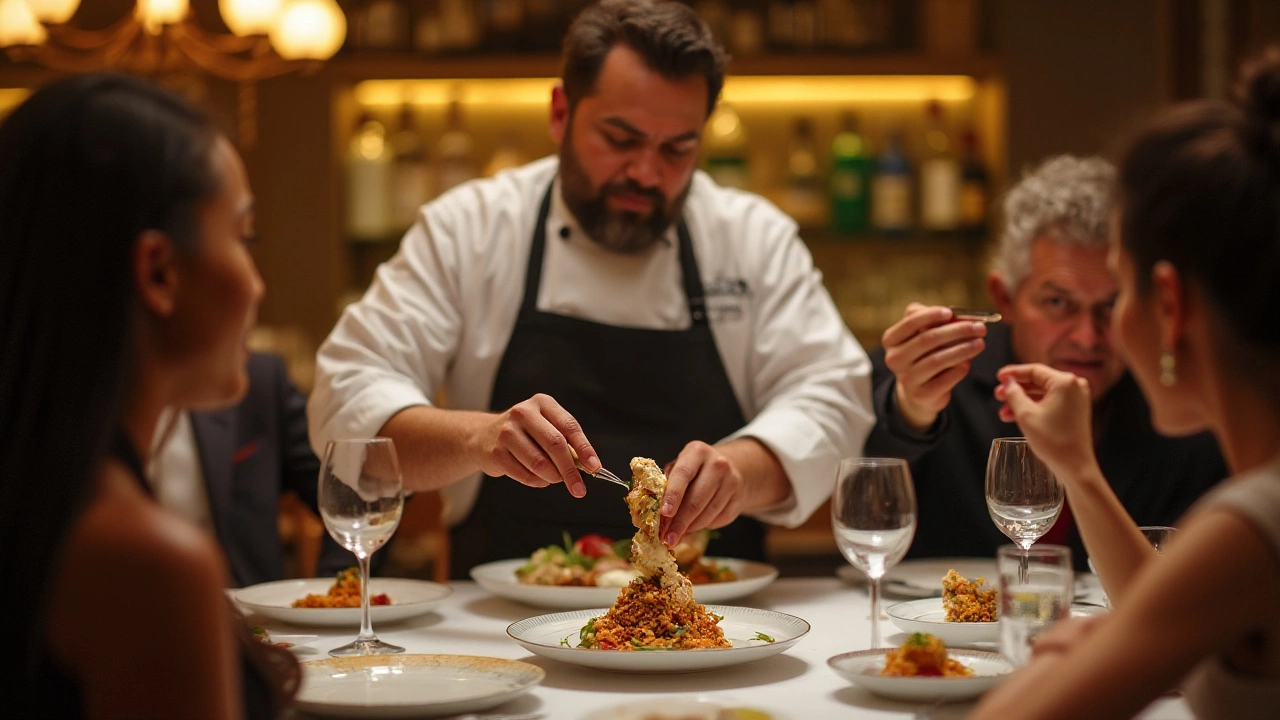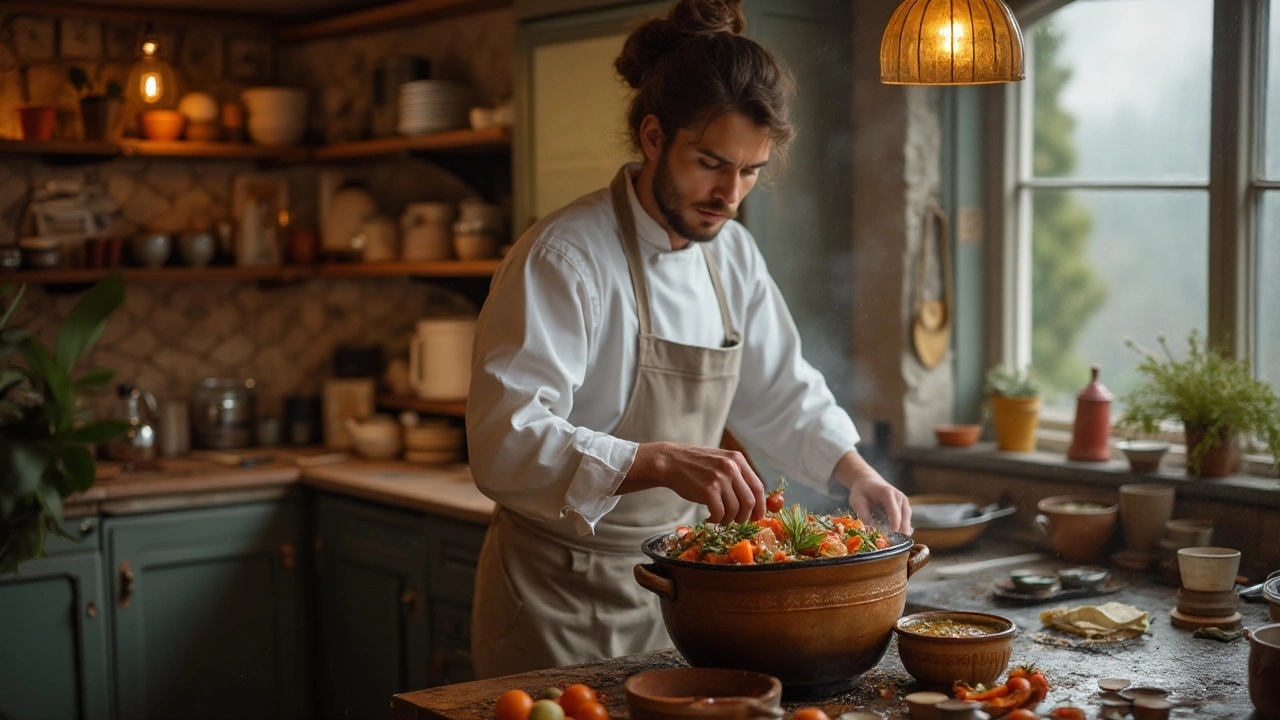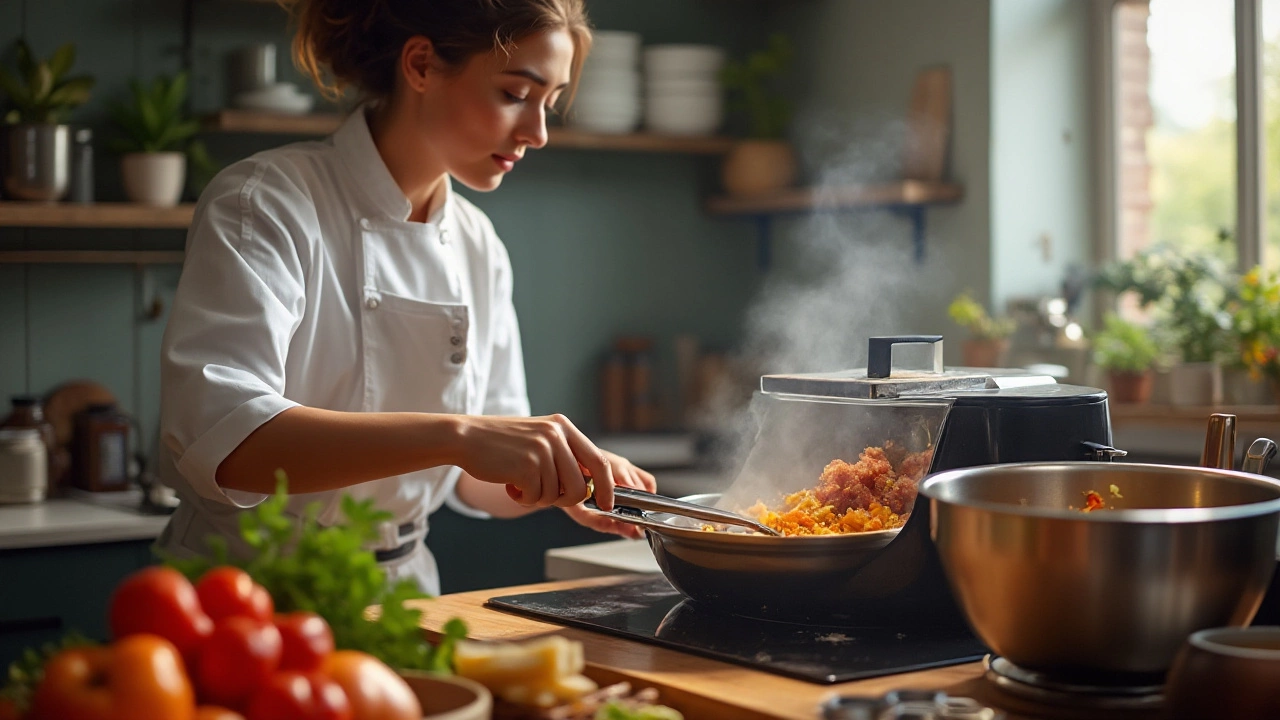In the world of culinary arts, the slow cooker is often regarded as a convenient tool, but one may wonder if it's popular among professional chefs. These versatile appliances, known for their ability to render hearty meals and tender meats, have carved a niche in home kitchens globally. However, the question remains: do they find a place in the fast-paced, precise environment of a professional kitchen?
As we delve into the dialogue with chefs, it becomes clear that the decision to use a slow cooker isn't about cutting corners. It's about harnessing a different kind of culinary magic. For some chefs, slow cookers serve as a secret weapon for extracting deep flavors and preparing dishes that require patience and a slow touch.
We'll explore how chefs integrate slow cookers into their culinary practices, revealing unique tips and tricks that elevate slow-cooked dishes. From mastering the art of perfect seasoning to avoiding common pitfalls, the slow cooker can become an indispensable tool for both novice and seasoned chefs alike. And yes, the delicious recipes that follow might just inspire a spot for a slow cooker in your own kitchen routines.
- The Appeal of Slow Cookers
- Chefs' Perspectives
- Benefits of Using Slow Cookers
- Tips for Maximizing Slow Cooker Use
- Creative Slow Cooker Recipes
The Appeal of Slow Cookers
Slow cookers have gained a significant following over the years, and it’s no surprise why they've become a staple in both household and professional kitchens alike. At the heart of their allure is the unique ability to transform simple ingredients into tasty, soul-warming dishes with minimal effort. Unlike traditional cooking methods that demand constant attention and precise timing, slow cookers offer a set-it-and-forget-it approach that perfectly suits the bustling lifestyle of today. The essence of slow cooking lies in its method—a low, prolonged heat which allows flavors to meld and ingredients to truly shine. This is particularly useful in extracting deep flavors from meats like beef stew, where the prolonged cooking times break down tough fibers, rendering succulent, melt-in-your-mouth results.
Interestingly, slow cookers are not just for amateurs. Many chefs appreciate the nuanced taste profile that slow *cookers* can impart in their dishes, a technique often referred to as 'flavor layering.' Take, for example, Chef Heston Blumenthal, who once remarked,
The magic of a slow cooker lies in its ability to enhance the natural sweetness of vegetables without over-sugaring the palate.Such insights bridge the gap between convenience and artistry, highlighting how the slow cooker can serve as an alternative canvas for chefs to experiment and refine their craft.
Moreover, the energy efficiency of slow cookers presents a hidden advantage. In a world increasingly conscious about energy consumption, these devices use significantly less electricity compared to conventional ovens. For long-duration recipes, this quality is ideal, offering succulent results over hours without the high utility costs. According to the U.S. Department of Energy, a conventional oven can consume 2,000 to 5,000 watts of power, whereas a slow cooker typically uses between 70 to 250 watts. This is particularly relevant for catering businesses and eco-conscious chefs striving for sustainability.
Another appeal of slow *cookers* is their versatility. Beyond soups and stews, these gadgets can whip up anything from bread and cakes to yogurt and pot roasts. This versatility challenges the misconception that slow cookers belong solely in a casual home setting and not in the realm of professional gastronomy. Moreover, they introduce the opportunity to infuse creativity into time-honored recipes. By trying different cooking times and temperatures, chefs can fine-tune flavors and textures, crafting dishes that set their restaurant's offerings apart.
Adding to the practical benefits is the emancipation they offer—freeing up a chef's time to focus on other culinary tasks. This enables seamless multitasking in busy commercial environments, where time is always of the essence. In restaurant kitchens where each second counts, having a slow cooker humming quietly in the background can result in a more harmonious workflow. Therefore, it's no wonder that slow *cookers* continue to charm chefs who are passionate about both flavor and efficiency.
Chefs' Perspectives
Stepping into a professional kitchen, one might not immediately spot a slow cooker amid the bustling array of high-tech gadgets and gleaming pots. Yet, for many chefs, this humble appliance holds a special place. The main allure it offers is the ability to achieve profound flavors with minimal intervention—perfect for those intricate dishes that demand time rather than constant attention. Chefs appreciate the slow cooker for its ability to transform inexpensive cuts of meat into fall-apart tenderness, allowing the ingredients to shine in their own right without much fanfare.
Many chefs express that using a slow cooker is not about taking shortcuts but about controlling time and temperature with precision. Take Chef Marcus, a renowned chef who has shared his admiration for slow cookers on multiple platforms. He once mentioned, "The beauty of the slow cooker isn't just in its convenience; it's in the mastery of flavor development over hours, not minutes." This appliance, in the hands of a skilled chef, can create dishes that seem to have been simmered in secret for days, much to the delight of their patrons.
The general sentiment among culinary professionals is that when used correctly, the slow cooker can supplement regular cooking methods. This stands especially true for preparing stocks, broths, and stews, where the deep extraction of flavors over time is desired. A survey revealed that about 35% of chefs in the bistro and diner industry consider slow cookers a valuable addition to their toolkit. Not because it replaces traditional methods, but because it enhances them. By freeing up stovetop space, chefs are able to focus on the intricacies of other dishes, optimizing their workflow in a busy kitchen.
For instance, in a fine dining setup, chefs might use a slow cooker to prepare a rich beef bourguignon or a delicate confit. The ability to set the device and allow it to work magic all day ensures that these complex dishes taste consistently delightful. Additionally, in a multicultural kitchen setting, slow cookers offer a canvas for chefs to experiment with global flavors—from Asian braises to Indian curries. Such versatility not only expands the menu possibilities but also enhances the dining experience.
Let us not forget about the modern trend of sustainability and reducing waste in professional kitchens. Chefs are recognizing the role of slow cookers in ensuring minimal food wastage. Leftover vegetable peels or bones can be transformed into flavorful stocks, contributing to a zero-waste philosophy. As these devices become a staple in chef’s arsenals, it is evident that slow cookers have evolved from being a household convenience to a professional necessity. As one culinary magazine highlighted, this shift in perception not only speaks volumes about kitchen innovation but also about the evolving culinary landscape that embraces both tradition and technology.

Benefits of Using Slow Cookers
Slow cookers have slowly but surely gained recognition for their multiple advantages, particularly for busy individuals and expanding families. A significant benefit lies in their ability to transform inexpensive cuts of meat into tender, flavorful dishes without demanding constant attention. This transformation is a result of the slow and steady cooking process over extended periods, which allows connective tissue to break down gently while preserving flavors and nutrients. It's this particular trait that makes slow cookers a favorite in home kitchens today.
Another appealing aspect of using slow cookers is energy efficiency. Compared to oven cooking, slow cookers consume less electricity, making them more sustainable for long-term use. In an era where energy conservation is ever-crucial, this fact resonates well with environmentally conscious chefs. Additionally, the simplicity of setting it and forgetting it ensures that a home-cooked meal is available without the daunting prep and cleanup usually associated with traditional cooking methods.
A well-regarded culinary blog remarked, "Embracing the slow cooking technique is not just about convenience, it’s about getting back to the roots of flavor." It’s not just the busy homemakers who appreciate the simplicity of these devices; many chefs are also extoll the virtues of slow cookers for their ability to enhance the cooking process.
Health is another piece of the puzzle. Slow cooking usually requires less oil and fats, and its low-temperature process helps in retaining and enhancing individual flavors. Such methods effectively keep nutrients intact and maintain the integrity of the ingredients used. With more people looking towards healthier lifestyle options, slow cookers provide an excellent way to prepare meals that are both nutritious and palatable.
A look at data reveals that approximately 83% of American households own a slow cooker, highlighting its popularity. This statistic is a testament to its versatility, as slow cookers are known for handling a wide variety of recipes, from hearty stews to sweet desserts. This multifaceted capability makes them a priceless addition to kitchens worldwide, offering endless menu possibilities with minimal fuss.
For individuals juggling several responsibilities, the slow cooker serves as an ally in the kitchen. The advantage of meal prepping becomes significantly more achievable, as one can prepare ingredients and store them for future use. Those who engage in bulk meal preparations find slow cookers indispensable in their routine, providing a stress-free way to organize one's meals for the week.
In summary, the benefits of slow cookers are manifold. Primarily, their capacity for slowly building flavors results in dishes that are robust and deeply satisfying. Moreover, their energy-efficient nature, along with the time-saving convenience they offer, leaves an indelible mark on our modern culinary practices. Whether you’re a novice or a seasoned chef, incorporating a slow cooker into your culinary arsenal can revolutionize your cooking habits in more ways than one. The key is to understand the potential this device holds and harness it effectively to suit your unique needs.
Tips for Maximizing Slow Cooker Use
Slow cookers, those beloved appliances that require minimal effort for maximum output, are a staple in many kitchens, offering a set-it-and-forget-it approach that aligns perfectly with our busy lives. However, to truly unlock their full potential, there are numerous tips and tricks worth exploring. A key aspect is understanding the need to adjust your seasoning game. Because these devices cook over long periods, spices and herbs may mellow out more than expected. Therefore, be generous with preseasoning, knowing that subtle flavors might fade during hours of simmering. Those who have grasped this often employ an extra dash of salt and a burst of fresh herbs towards the end to enliven the dish.
Moreover, consider the implications of adding dairy products too early in the game. Cheese, milk, and cream can curdle during long cooking hours, creating unappealing textures. If your recipe calls for such ingredients, add them in the final stages of cooking. This ensures they integrate smoothly. Many seasoned cooks even opt for a quick whisk or blend to achieve a velvety finish.
"To avoid that unwanted curdle temptation, add dairy after the fact. The trick is timing." — Julia Child, an advocate for balanced and considerate cooking methods.
Temperature and layering also play significant roles in ensuring meals turn out well. As a general rule, always place denser foods such as meats and root vegetables closer to the heat source at the bottom of the pot. Leafy greens and delicate veggies, which need less cooking, should come later or stay on top. Understanding the science behind this not only improves taste but maximizes nutrition retention. Remember, every ingredient has a sweet spot in the cooking chain that, when respected, creates harmony in flavors.
Enhancing Texture and Flavor
Developing texture and deep flavors requires a bit of creativity with pre-cooking steps. One such step involves browning your meats before adding them to the slow cooker. This Maillard reaction enhances taste and lends a pleasant aroma that permeates throughout the cooking process. While many users might skip this step for convenience, it nevertheless elevates the dish to gourmet status. Furthermore, experimenting with alternative thickening agents like cornstarch or arrowroot can make stews richer without relying solely on prolonged cooking to achieve the desired viscosity.
One shouldn't overlook the merits of using liner bags or parchment paper within the slow cooker. Apart from making clean-up a breeze, these can also help with separating components of a dish that benefit from distinct cooking times and conditions. It’s a technique embraced by chefs who seek perfect textures and service-ready presentation in their creations. These subtleties, while simple, add cumulative value to the final dish that diners instinctively appreciate without knowing why!
Lastly, utilize leftovers creatively in your slow cooker. Imagine transforming yesterday's dinner into a robust soup or a flavorful hash. A slow cooker can work wonders in renewing ingredients, bringing them together into entirely new meals. The versatility comes from understanding your machine's capacity and marrying that with the myriad of ingredients at your disposal. It is this kind of imaginative cooking that truly makes the slow cooker an indispensable tool.

Creative Slow Cooker Recipes
The slow cooker is more than a jack-of-all-trades; it’s a culinary revolution for those who appreciate flavors that evolve and intensify over time. Imagine setting up a dish in the morning and returning to find it gloriously cooked, bursting with taste and aroma. One of the underappreciated beauties of the slow cookers is their ability to transform tough cuts into tender, flavorful masterpieces. A fine example is the slow-cooked beef stew, where each morsel of meat rejoices in the company of complementary vegetables, all soaking in a savory broth that’s perfectly seasoned.
Let's not forget the world of international dishes that get an encouraging boost from slow cookers. Indian curries, with their complex amalgamation of spices, turn into an aromatic delight when left to simmer and blend slowly. A slow-cooked chicken tikka masala, with its creamy tomato base, becomes an ethereal experience. The spices have the time they need to mingle with the chicken, resulting in a dish that is both rich and harmonious. For vegetarian enthusiasts, a slow-cooked eggplant parmesan delivers each layer softened perfectly, melding cheese and sauce into a comfort dish par excellence.
For those looking to experiment, the realm of slow cooker desserts is a revelation. Imagine a molten chocolate lava cake emerging from a slow cooker, with each bite offering warm, gooey decadence. There’s a delightful surprise in knowing the slow cooker is not just a weekday dinner companion but a weekend sweet indulgence facilitator. With apples, cinnamon, and a touch of nutmeg, you can also craft a spiced apple cake that’s perfect for chilly afternoons. This transformation ability is precisely what makes slow cookers so engaging for creative culinary experimentation.
Chef James Martin, a renowned culinary figure, once said, "Embracing the slow cooker allows you to explore flavors at a depth that's immeasurable with quick cooking methods." Such sentiments underscore why professional chefs appreciate this humble appliance, not for shortcuts but for enhancing taste. A slow cooker adds new dimensions to the art of deliberate cooking, leaving room to innovate while ensuring that the outcome is never less than delightful.
These innovations are not just limited to traditional recipes. The slow cooker’s versatility manifests in everything from spicy pork carnitas – where the meat emerges succulent and ready for tacos – to heartwarming chilies, where beans and spices blend into a hearty dish that satisfies with every spoonful. For breakfast enthusiasts, a slow-cooked oatmeal with berries can fill the kitchen with an inviting aroma and offer a nutritious start to the day.
While the slow cooker continues to uphold its legacy as an essential tool in home kitchens, its boundary-pushing potential invites chefs and home cooks alike to try new things. It’s clear that chefs, like all of us, find joy in culinary creations that rise to the challenge, delivering unexpected satisfaction. With everyday ingredients and a touch of curiosity, this humble appliance can transform into a gateway for extraordinary meals. So whether you’re a seasoned professional or a curious home cook, the slow cooker’s ability to infuse passion into cooking is a journey worth embarking upon.

